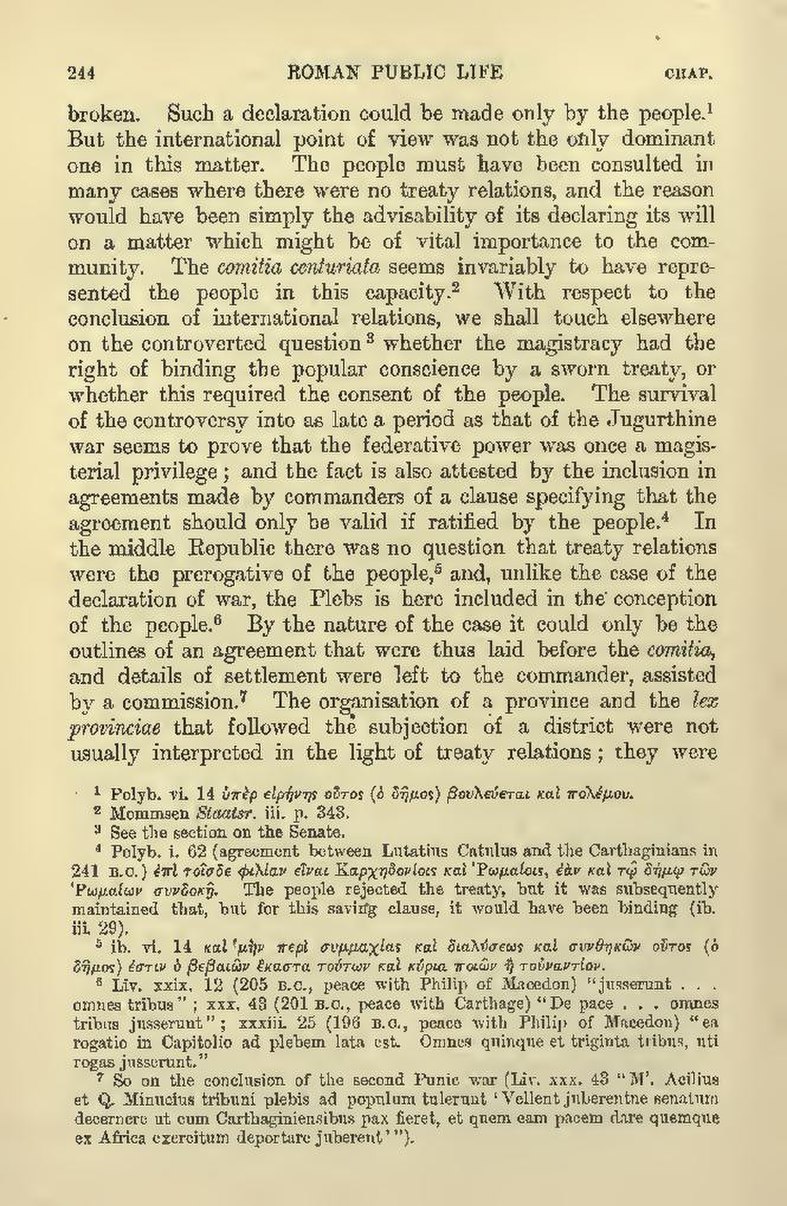broken. Such a declaration could be made only by the people.[1] But the international point of view was not the only dominant one in this matter. The people must have been consulted in many cases where there were no treaty relations, and the reason would have been simply the advisability of its declaring its will on a matter which might be of vital importance to the community. The comitia centuriata seems invariably to have represented the people in this capacity.[2] With respect to the conclusion of international relations, we shall touch elsewhere on the controverted question[3] whether the magistracy had the right of binding the popular conscience by a sworn treaty, or whether this required the consent of the people. The survival of the controversy into as late a period as that of the Jugurthine war seems to prove that the federative power was once a magisterial privilege; and the fact is also attested by the inclusion in agreements made by commanders of a clause specifying that the agreement should only be valid if ratified by the people.[4] In the middle Republic there was no question that treaty relations were the prerogative of the people,[5] and, unlike the case of the declaration of war, the Plebs is here included in the conception of the people.[6] By the nature of the case it could only be the outlines of an agreement that were thus laid before the comitia, and details of settlement were left to the commander, assisted by a commission.[7] The organisation of a province and the lex provinciae that followed the subjection of a district were not usually interpreted in the light of treaty relations; they were.]. The people rejected the treaty, but it was subsequently maintained that, but for this saving clause, it would have been binding (ib. iii. 29).].]
- ↑ Polyb. vi. 14 [Greek: hyper eirênês outos (ho dêmos) bouleuetai kai polemou
- ↑ Mommsen Staatsr. iii. p. 343.
- ↑ See the section on the Senate.
- ↑ Polyb. i. 62 (agreement between Lutatius Catulus and the Carthaginians in 241 B.C.) [Greek: epi toisde philian einai Karchêdoniois kai Rhômaiois, ean kai tô dêmô tôn Rhomaiôn syndokê
- ↑ ib. vi. 14 [Greek: kai mên peri summachias kai dialyseôs kai sunthêkôn outos (ho dêmos) estin ho bebaiôn ekasta toutôn kai kuria poiôn ê tounantion
- ↑ Liv. xxix. 12 (205 B.C., peace with Philip of Macedon) "jusserunt . . . omnes tribus"; xxx. 43 (201 B.C., peace with Carthage) "De pace . . . omnes tribus jusserunt"; xxxiii. 25 (196 B.C., peace with Philip of Macedon) "ea rogatio in Capitolio ad plebem lata est. Omnes quinque et triginta tribus, uti rogas jusserunt."
- ↑ So on the conclusion of the second Punic war (Liv. xxx. 43 "M'. Acilius et Q. Minucius tribuni plebis ad populum tulerunt 'Vellent juberentne senatum decernere ut cum Carthaginiensibus pax fieret, et quem eam pacem dare quemque ex Africa exercitum deportare juberent'").
